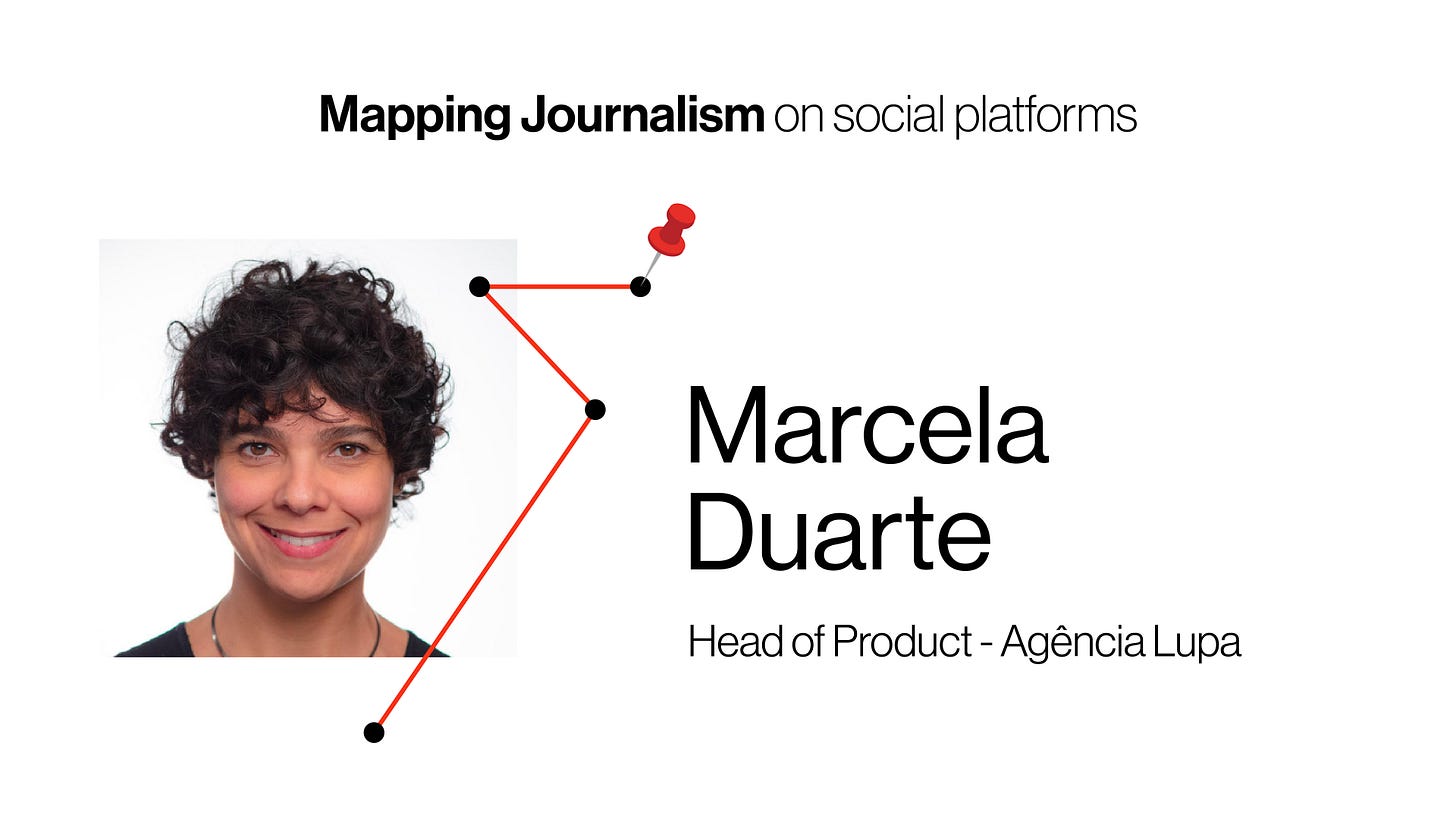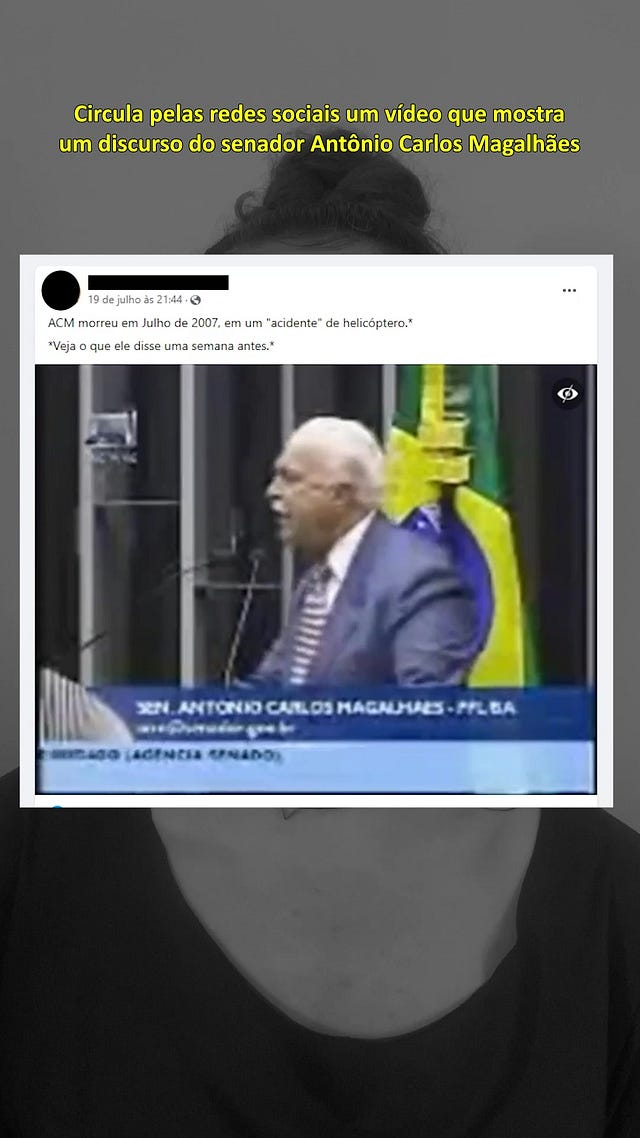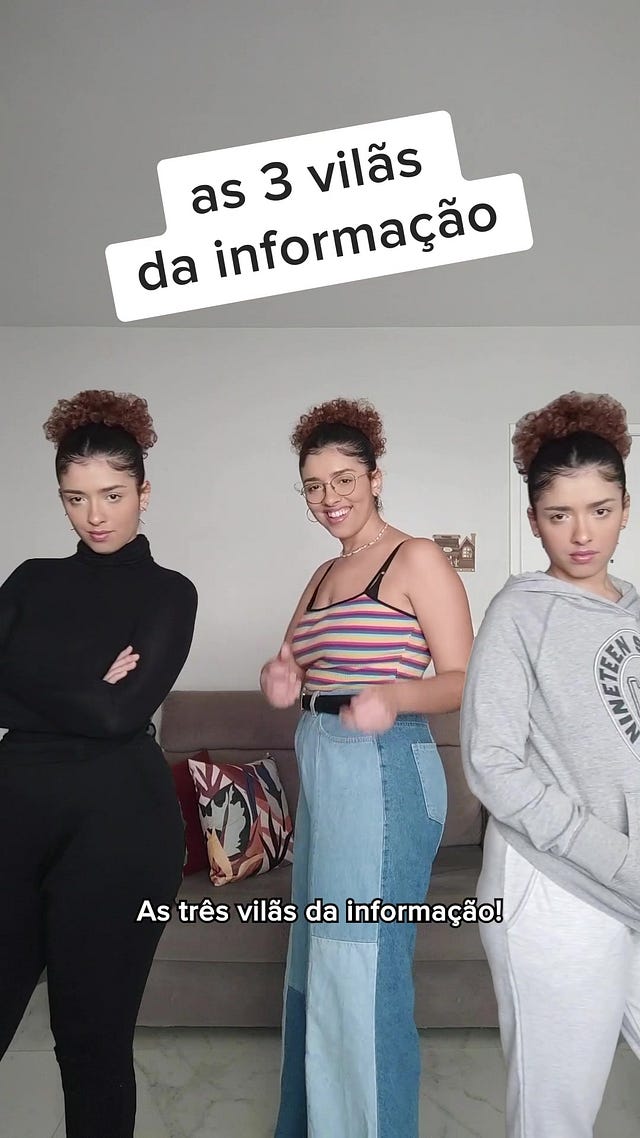How Lupa is fighting disinformation and teaching media literacy on TikTok
With financial support from TikTok
Hey there! I'm Francesco Zaffarano, and this is Mapping Journalism on Social Platform, a biweekly newsletter featuring chats with people pushing journalism's boundaries on social platforms.
Over 400 people subscribed even before this newsletter started. I am grateful for your support, and I hope you will enjoy this first issue. If someone forwarded this email to you and you want to subscribe, you can do it here:
New on the Mapping Journalism directory
Over the holidays, I have added 360 new accounts to this list of publishers on TikTok – it’s the biggest single update, covering accounts from Africa, Asia, North and South America, Australia, and Europe. I want to thank Nic Newman, the Reuters Institute's senior researcher, who shared with me the accounts he analyzed for his latest report.
Also, the Mapping Journalism directory now includes a list of publishers’ channels on Telegram. Check it out, and please flag new channels here.
And now, let’s dive into this week’s Q&A.
Q&A: How Lupa fights disinformation on TikTok
For this issue’s interview, I spoke with Marcela Duarte, head of product at Lupa, a fact-checking and media literacy hub. Marcela is a journalist with 20 years of experience who worked in large national newsrooms, dedicating herself to digital content, innovation, and product. She also translated to Brazilian Portuguese the NY Times bestseller The death of truth by Michiko Kakutani.
Last month, Lupa received the TikTok Brazil Awards 2022, in the TikTok For Good category, for its contribution to combating misinformation and producing educational content on the platform.
FZ: Can you describe your role at Lupa?
MD: I’m head of Product at Lupa, where I lead the journalism and education strategy. This means I am responsible for putting the audience at the core of what we do and connecting it to our business model.
FZ: Ok, so let’s start from this – how does TikTok fit into your broader company strategy?
MD: In 2021, we decided to change Lupa’s focus as a company. Before that, we presented as a fact-checking agency but wanted to expand into education and make journalism and education our two pillars. Our ultimate goal was to turn Lupa into a hub to fight misinformation and disinformation.
As part of this plan, we wanted to reach and engage with younger audiences, so we started to think about how we could do that. At some point, we decided to pitch a project to TikTok, so we reached out to the policy team here in Brazil, and they eventually agreed to support it. In 2022 we launched our media literacy project, and TikTok is currently paying us to produce videos focused on media literacy for young users.
In the past 12 months, Lupa’s community on TikTok grew by 76%, reaching more than 240k people in December 2022.
FZ: What kind of content do you produce on TikTok?
MD: We have two formats: fact-checking videos and media literacy explainers sponsored by TikTok. The former is the best performing, but the latter generally performs well.
FZ: What else does TikTok do to help you apart from supporting you financially?
We select the guest TikToker for the monthly live stream, and TikTok helps us find them among the active creators on the platform. All episodes are hosted by Raphael Kapa, Lupa’s education coordinator. They are generally split into two parts – one more theoretical with Raphael about media literacy, and one is a conversation between Raphael and the guest TikToker on the episode's topic.
FZ: Why did you focus on media literacy, and why do you think TikTok is helping you with this project?
MD: Many platforms are cutting budgets and efforts to contrast misinformation and disinformation, while fact-checking content supported by the platforms should be the norm. But honestly, fact-checking on its own will not resolve the problem of disinformation. The next step to take is to educate people so that they can recognize what is correct information when they see that.
As for TikTok, I think they are doing this because, in Brazil, all platforms have been under pressure to take action. And you know, with the general elections, 2022 was a very challenging year for Brazil, so I think they decided to do this to demonstrate they are trying to do their part.
FZ: How do you decide what stories to fact-check for your videos?
MD: The fact-check videos we post on TikTok are always linked to articles published on the website, and all content on Lupa’s website is based on requests from the community. We receive requests for stories via our WhatsApp bot, Facebook, and DMs on Instagram, Twitter, and TikTok. We prioritize the most flagged stories because we want to fact-check only already widely shared stories.
FZ: What is the most challenging part about fact-checking on TikTok?
MD: To keep it short.
FZ: What is the most important thing you have learned while working on TikTok?
MD: Your journalists must know how to communicate on different platforms. You need to train journalists to make content for TikTok. You must refrain from taking an influencer to do the work of a journalist. Initially, we tried to get a creator to be Lupa’s host on TikTok, but it didn’t work.
We trained four team members to become our face on TikTok. We have one journalist who hosts our fact-checking videos and four Lupa team members who work on media literacy content. We still work with influencers, but we figured out it’s best for us to involve them just in the live events.
FZ: What would you do differently if you started Lupa’s account today?
MD: I would have invested more firmly from the start. We tried to test it very timidly, and a year later, we started investing in the platform.
FZ: Can you suggest three accounts I should check on TikTok?
These three accounts I love are:
@loicsuberville - a guy making fun of English and French language
@bestofvogue - well, this doesn’t need an explanation
@os22_oficial - a profile about dancing, a very Brazilian dancing
They are not journalistic accounts, but I think it’s essential for journalists to look at how people use TikTok for all purposes because, for media companies, it is tough to speak the language of TikTok. So you must spend time on the platform and look at how people talk there.
Note: you can watch three samples of Lupa’s videos with English subtitles here.
Find +370 journalism projects on TikTok here. Do you know an interesting journalism project on TikTok? Flag it to me here.
One question for you
I want to write a newsletter that you will find helpful and valuable. So, please let me know how I can improve it and respond to this single-question survey.
Three things to read
📌 Nic Newman’s research on news publishers on TikTok – Reuters Institute
📌 My op-ed (also) on why TikTok is not the “end of social media” – Nieman Lab
📌 An analysis of TikTok’s algorithm - Knight First Amendment Institute
That’s all for this issue. If you liked it, please share it on social media or forward it to your colleagues and friends.
— Francesco








Very insightful! thanks